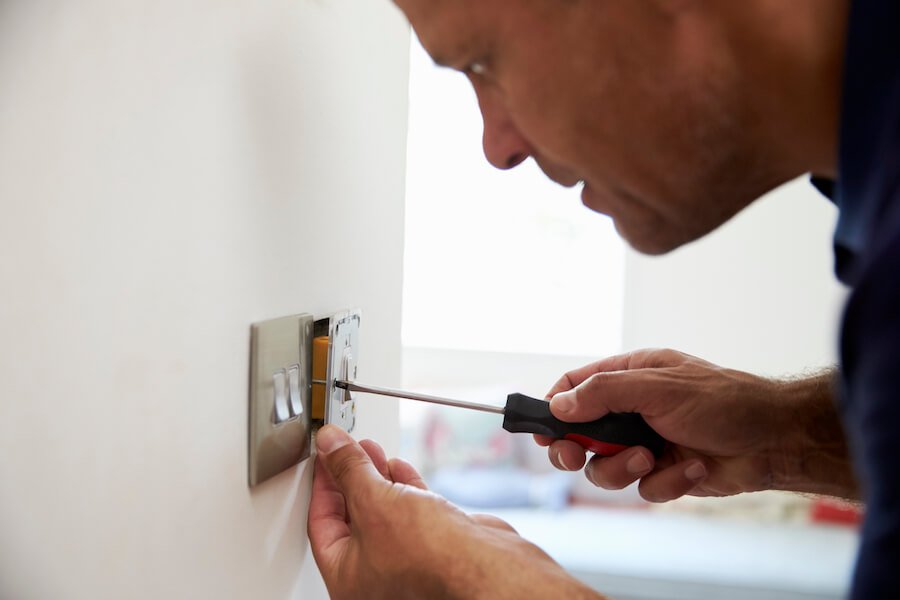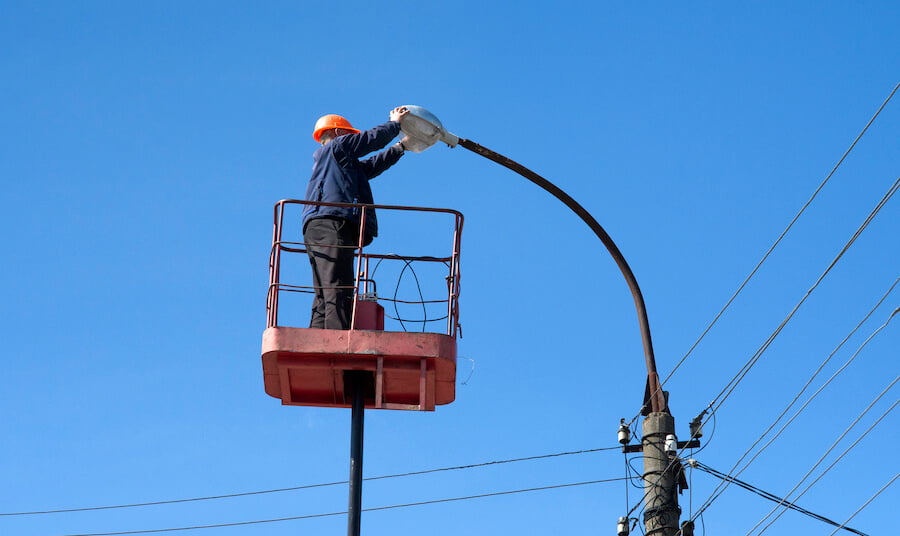As an electrician, you will be expected to install, maintain, and repair electrical lines, communications, and control systems in homes, businesses, and factories.
Electricians typically begin their education at a technical school but also learn through apprenticeship. Most states require electricians to be licensed.
Electricians work full-time, on the weekends, and in inclement weather. It is possible also for an electrician to work overtime.
Bottom Line: as of May 2018, the outlook and pay for electricians is very good. According to the Bureau of Labor Statistics, the median annual wage for electricians is $55,190.
Pay & Career Outlook to Become an Electrician
The median pay for electricians is $55,190. “The median wage is the wage at which half the workers in an occupation earned more than that amount and half earned less” (Bureau of Labor Statistics).
Government electricians are paid at a median annual salary of $62,110.
The lowest 10 percent of electricians earned in May 2018 $32,940.
The highest 10 percent earned $94,620.
Apprentices earn less than fully trained electricians.
Electricians tend to join unions. For more information, visit the largest organizer of union membership for electricians: International Brotherhood of Electrical Workers. The organization is located in Washington, D.C, but they serve local areas.
The career outlook for electricians is high. It is projected to grow nine-percent by 2026 (Bureau of Labor Statistics).
This percentage is due to the increase in demand for construction and alternative energy sources. Alternative power generation such as solar and wind is in demand.
Electricians are needed to help link alternative power sources to homes and power grids.
Employment of electricians will be based upon changes in government policy.
Bottom Line: job prospects for electricians who complete coursework in alternative power generation will have the best opportunities in the coming decade.
Electrician Qualifications
Becoming a qualified electrician requires physical strength and stamina to do the job. They must have the critical thinking skills to perform tests and diagnose problems.
Electricians must be able to read a multimeter to check the voltage, amperage, and resistance when an outlet is not working.
- Electricians must also be able to communicate with their peers on a regular basis.
- Electricians need color vision so they can read electrical wires by color.
- They also troubleshoot problems, including electrical failures.
How to Become an Electrician
Becoming a qualified electrician may involve both technical education and apprenticeship training.
Education
In becoming an electrician, you will need to possess a high school diploma or complete your GED.
Some students begin with a technical school on how to become an electrician, taking and completing coursework in circuitry, safety practices, and electrical information.
Bottom Line: graduates of technical programs receive credit towards an apprenticeship training.
Electrician Apprenticeship
Apprenticeship is typically four to five years. For each year, apprentices receive credit for on-the-job-training on how to become an electrician.

Electrician Training
As an electrician needed, you may receive classroom training where you will learn electrical theory, blueprint reading, mathematics, and the electrical code regulations.
You will also learn safety and first-aid procedures needed for how to become an electrician.
You will receive specialized training in aspects of the field that require knowledge of soldering, communications, fire alarm systems, and elevator installation.
An electrician apprenticeship is typically sponsored by contractor associations and sponsor apprenticeship programs.
Electrical contractors may also provide training, which may include classroom and on-the-job-training.
However, there is no guarantee that electrical contractors are recognized as approved apprenticeship programs. You must check with your local and state organizations.
Electrician Programs
Some organizations such as the Home Builders Institute (HBI) offer pre-apprenticeship programs where students can receive preapprenticeship certificate training (PACT).
The electrical training center at HBI serves the following diverse populations:
- Transitioning military members
- Veterans
- Unemployed and displaced workers
- Secondary and post-secondary students
- Justice-involved youth
At the electrician school, students receive training and skill development in carpentry, masonry, plumbing, building construction technology, weatherization, and electrical.
Students receive classroom and job site experience on how to become an electrician.
In completing the coursework at the electrical trade school, students learn how to install the following:
- Circuit panels
- Electrical conduit required for wiring homes and businesses
- Cabling
- Switches
Bottom Line: apprentices learn how to test and repair systems. They also learn how to use green building techniques to conserve energy.
Licenses & Certifications
The best way to become an electrician is to pursue a license and/or certification. Electricians are required to pass a test to be licensed.
The tests measure knowledge of the National Electrical Code for state and local electrical codes, which set standards for safe installation of electrical wiring and equipment.
The National Electrical Contractors Association provides information about the requirements of the test. The website provides information on state licensing.
You can visit the site here for more information. The site also provides information about electrical codes and regulations by state.
Lastly, the site houses a learning center and webinars to help you train, study, and pass certification tests and maintain your license.
Electricians are also required to complete continuing education courses to maintain their licenses through an electrician trade school.
Continuing education courses measure knowledge of safety practices, changes in the electrical code, and training needed for manufacturing products.

Electrician Job Description
As an electrician, you will possess knowledge about blueprints, technical diagrams, and state and local building regulations.
You will also have the knowledge to install and maintain wiring, inspect electrical problems, and replace wiring. The following are typical duties:
- Have a firm understanding about technical diagrams
- Possess the skill to install and maintain wiring and lighting systems
- Work with electrical components, including transformers and circuit breakers
- Repair wiring, equipment, and fixtures
- Use hand tools and power tools
- Follow local and state regulations under the National Electrical Code
- Direct and train other electricians
Because buildings have electrical power, communications, and control systems, you will also possess some construction knowledge regarding building maintenance, building structure, lights, appliances, and equipment.
Newly constructed buildings often require less complicated maintenance, but you will still learn the electrical wiring of newer buildings and how to make buildings accessible to accommodation standards.
Electrical systems show the design of circuits, outlets. This requires knowledge of the use of proper power tools such as conduit benders to run and protect wiring.
You will also use other hand and power tools including screwdrivers, wire strippers, drills, and saws.
You will troubleshoot electrical problems using ammeters, voltmeters, thermal scanners, and cable testers.
This will help you find problems and ensure that electrical wiring is operating properly.
Work Environment
You will work in different environments as an electrician. Electricians work for multiple employers. The following are types of employers:
- Electrical contractors and wiring installation contractors
- Self-employed workers
- Government
- Employment services
The largest employers of electricians are contractors.
Electricians work in cramped spaces, standing and kneeling for long periods of time. The work can be tiring, and long-distance commuting is often required.
Electricians must have reliable transportation.
They must be able to work in noisy environments especially in factories. They tend to use hearing protection.

As an electrician, you may work indoors, outdoors, at homes, factories, and construction sites. As a self-employed electrician, you will work alone.
Bottom Line: electricians who work for companies will often work as a member of a crew and collaborate on multiple projects.
Safety
Injuries and illnesses come with the job of being an electrician.
The work of an electrician is dangerous and may include accidents as a result of electrical shocks, falls, burns, and related injuries.
Electricians wear protective clothing and safety glasses.
Collaboration
Electricians often work alone, but also collaborate with others in a team environment.
Experienced electricians may work with building engineers, architects, and construction project managers in designing electrical systems.
Electricians may consult construction specialists when designing electrical systems for elevators, heating and air conditioning, and related power systems.
Electricians may also work with apprentices to help them complete their jobs.
Lineman Electricians
Becoming an electrician requires working with lineman electricians when installing distribution and transmission power lines that deliver electricity and service to residential and commercial customers.
Line installers and repairers, known as line workers, install and repair electrical power systems and telecommunication cables, include fiber optics.
The line worker’s job is hazardous because they work with high-voltage electricity. The work is physically demanding, and they work irregular hours. Line installers are proficient in technical instruction.
This is why it is important for electricians to become a qualified electrician to work closely with lineman electricians because they work under challenging work conditions, such as rain, snow, and storm, to keep electricity and communications flowing.
Line installers can be electrocuted. To prevent injuries, line installers and repairers use fall-protection equipment while they work at great heights.
Bottom Line: electricians are expected to work full time, evenings, weekends, overtime, and in inclement weather. Self-employed electricians set their own schedules.
